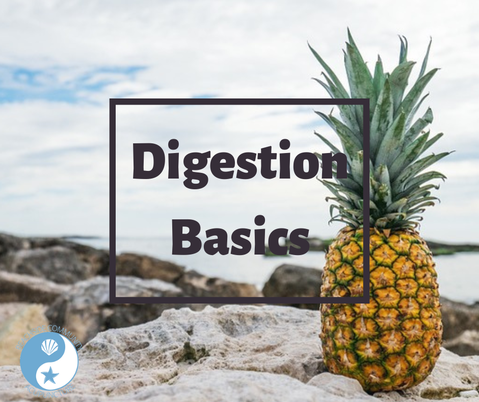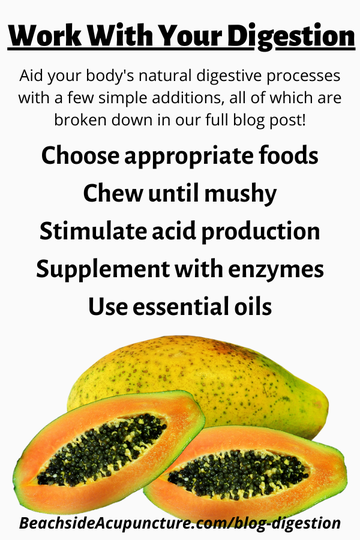
This post contains affiliate links, meaning Beachside Community Acupuncture PLLC may receive a small commission for purchases made through certain links at no additional cost to you. (In other words, you support us in a small way when you buy the products that we highly recommend and would use ourselves!) Click here to view our full disclosure policy.
The body will digest what you feed it regardless of whether you know how digestion works or not, but having an idea of the process means that you can support it and give it a bit of extra help if needed. If you've never completely understood how the gastrointestinal tract is put together, this over-simplified blog post is for you!
Step 1: Mind
While the brain is not a digestive organ per se, it does have a huge impact on digestion. Visualize your favorite food, with all of its smells, textures, and tastes. If you go into enough detail, you'll start to salivate as the body prepares for the delicious meal that it now expects. The mind can also override physical urges, like in the case of emotional eating or many eating disorders.
When it comes to digestion, then, first analyze your mind: When you want food, are you actually hungry, or is your brain telling you that food will calm your stress and make you feel better? When you sit down for a meal, are you still thinking about a million other things, or are you focusing on your food to eat mindfully?
Ideally you would be in the "rest and digest" state every time you eat, which might mean actively taking steps to get yourself out of the "fight or flight" associated with stress. Taking a few deep breaths and saying a little prayer of gratitude can help transition from one state to the other, as can eating in a calming space with few distractions. Try not to multitask while you're eating, and give yourself plenty of time to finish your meal so you don't feel rushed.
Step 2: Mouth
Many people underestimate the mouth's importance in digestion, but it sets the stage for how food will travel through the gastrointestinal tract. If you skip the first step and eat while rushed and distracted, chances are high that you'll be taking big bites and big swallows. The stomach is designed to chemically break down small pieces (as we'll see in the next step), so large chunks will just sit in it and cause issues. Chewing your food, therefore, can make a huge difference!
Some people advocate counting your chews, but if you're eating mindfully - meaning you're fully engaged in the present moment during your meal - you should be able to feel when your food is mushy enough to swallow. Spending more time chewing will also give the enzyme salivary amylase more time to do its job of breaking down carbohydrates in the mouth, also lessening the load of the stomach and intestines.
Step 3: Upper Digestive Tract
Here we'll consider the "upper digestive tract" to be the stomach and small intestine, which are arguably the two organs that most people think of when it comes to digestion. After food travels through the esophagus from the mouth, it will hit the stomach. The muscles within the stomach churn its contents, and hydrochloric acid and enzymes work to convert nutrients into smaller compounds. From there, everything will enter the small intestine, where more enzymes are released (with the involvement of other organs) and the tiny compounds are absorbed into the bloodstream to travel to other parts of the body.
If you're having issues at this stage, supplements and essential oils can be very helpful. First, prime the stomach to start acid production five to ten minutes before your meal by drinking apple cider vinegar or herbal bitters diluted with water. You can also take betaine hydrochloride (such as Standard Process's Zypan) to give the stomach more acid directly. This alone may be enough, but digestive enzymes will provide even more assistance. Each macronutrient has its own corresponding enzymes, and most enzyme supplements will contain a mix of all of them. Essential oils like Peppermint and Fennel - both included in the Young Living blend DiGize - also ease digestion.
From a Traditional Chinese Medicine perspective, cold foods will weaken the digestive system, as will raw vegetables. Sticking with warm, cooked foods is a good idea until symptoms alleviate, and if your system is very weak, only eating soups of pureed, cooked vegetables and bone broth for a few days will take most of the burden off the digestive organs so that they can recuperate.
Step 4: Lower Digestive Tract
The waste leftover from the small intestine then travels to the large intestine, where it will make its way to the rectum for excretion. It may seem like the large intestine doesn't do much, but that's not the case! Water and some nutrients are reabsorbed here, and the colon is home to a system of organisms called the gut microbiome, which has a large influence on the rest of the body. A probiotic supplement can get the microbiome back in balance, as can consuming probiotic-rich foods and beverages like sauerkraut and kombucha. Being mindful of water intake and fiber (found in plants) will also ensure smooth bowel movements.

Even if you don't have obvious digestive issues, it's worth supporting the process because of its importance on overall health. Your day-to-day energy comes from the food you eat, and everything you consume gets broken down into the nutrients that the body uses as building blocks to function and heal. 95% of your serotonin - the neurotransmitter associated with happiness - comes from your gut, and 70-80% of your immune cells are in your gut as well. Working on digestion can have far-reaching wellness benefits!

Kathleen Ketola is a Licensed Acupuncturist and the owner of Beachside Community Acupuncture. She loves providing affordable acupuncture to the residents of McKinney, Texas, and surrounding cities like Prosper, Frisco, and Plano, but she also enjoys educating the general public on how acupuncture and Traditional Chinese Medicine (TCM) can treat everything from pain to infertility to stress and beyond. Click "Book Now" at the top of this page to book an appointment or feel free to contact her at (214) 417-2260.








